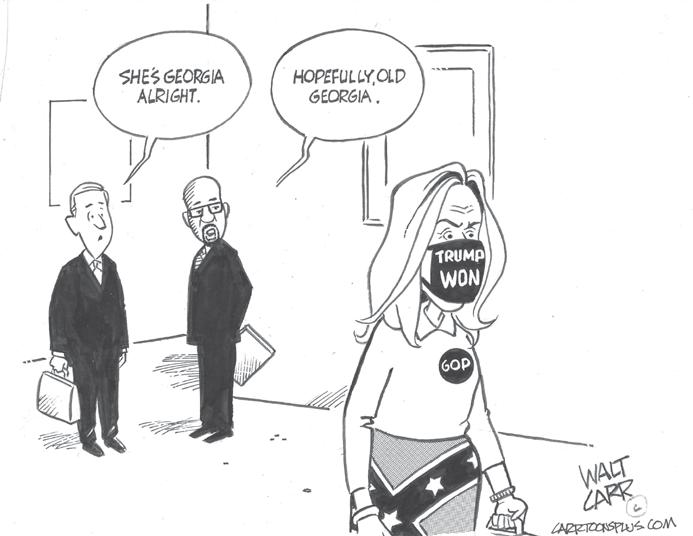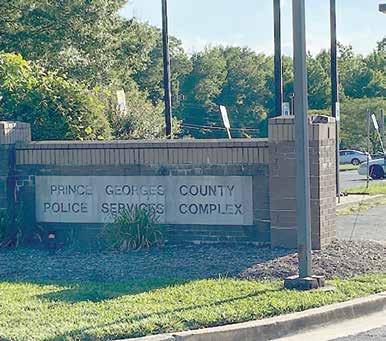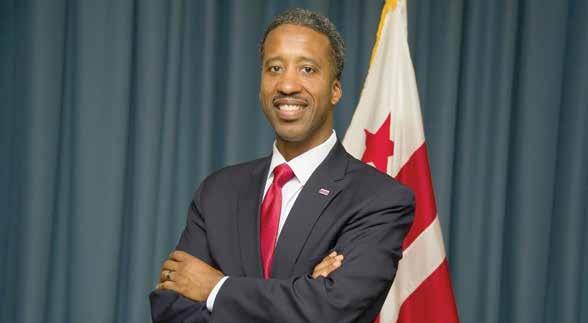
16 minute read
OpEd
EDITORIAL
Will March 1 Mark the Start of Better Days or the Slide Over the Cliff?
Schools in the Greater Washington Area and across the U.S. continue to point to March 1 as “D-Day” – the proposed date when many school districts will pivot toward increased in-person learning for hundreds of thousands of students.
But March 1st will be “D-Day” for another reason which will undoubtedly be equally alarming for Americans, particularly those living in the DMV: the end of a months-long moratorium on evictions and protections from the shutoff of utilities.
In both cases, with the parents of students being urged to send their children back to class and with utility service providers, landlords and banks in control of mortgages allowed to kick start legal proceedings in search of past due balances, the results, we fear, may be catastrophic.
However, we’ve heard very little about what Americans can expect on March 1 as the last weeks of winter come to an end and spring begins to rear its normally beautiful head.
We have heard promises about more opportunities being readied for those who wish to take the vaccine for COVID-19. And we’ve heard that plans have been set in motion to assist taxpayers with early filing and, if appropriate, earlier tax refunds.
But we remain concerned about the coming weeks and the possibility that for millions of Americans, the long, inevitable slide into the abyss may begin in full force – like a fast-paced avalanche.
There’s no way that the average American family will be able to pull themselves out of this quagmire that impacts so many due to the coronavirus and the changes that we’ve been forced to endure. It will take time – weeks, months – for some even years.
Unfortunately, plans and strategies that might assist Americans with this difficult process of recovery remain vague at most – if they exist at all.
And that should cause all of us to fear the future.
WI
The Trust Blacks Won’t Give, but Need
COVID-19 presents yet another case of Black America’s distrust in government institutions. Even though Black people reportedly represent the highest number of U.S. citizens to contract the deadly virus and the highest number who die from it for many reasons, they are also among the most astounding number by race that refuses to take the life-saving vaccine.
This is of no surprise to Black doctors or legislators. For months, they tried to prepare for the hard sell required to get the message into the heads and the vaccines into Black people’s arms. The horrible truth about the men who died in the Tuskegee experiment or Henrietta Lacks, whose cells were used for research without her consent, are commonly known among Black people. Why trust institutions responsible for denying them equal and affordable access to healthcare that also allows them to suffer and die more from preventable and curable diseases?
Yet, the resistance by Black people manifests the depth of their suspicions about government-related programs and policies. When banks were allowed to sell sub-prime loans and engage in other predatory lending practices, Blacks were the victims; and they were so distrustful that they resisted programs aimed to help. Consequently, the impact of the housing crisis lead to a profound Black loss of wealth and the impact continues. With the COVID-19 moratorium on rental and utility payments, again, Black people represent the highest number of potential victims of evictions and utility shut-offs, yet they are not responding to programs that offer help.
When Black people don’t get a quick and positive response for aid, they most often decide it’s not meant for them. They are painfully accustomed to being discriminated against and treated unfairly. And, in many cases, their feelings are spot on. But now is not the time to distrust resources aimed at helping every American including housing and utility assistance programs, and a vaccine that save lives, including Black lives.
WI

Pandemic Snow Just Not the Same
While I love the snow days we've had, they don't quite feel the same during a pandemic. Snow days use to be a reprieve from the world, now it feels like even more of a chokehold. Aside from the scenic views, there are no upsides to snow these days, not even a day off.
Hilaire Bivens Washington, D.C.
TO THE EDITOR
Back to School
I believe kids need to return to school! People want to talk about safety, but children are going everywhere else — the gas station, the mall, grocery stores, birthday parties, etc. Just like they wear a mask to those places, they can do the same to the most important place — SCHOOL! It's a must. The rich kids are just fine while the poor are suffering!
Vernon Gregory Washington, D.C.
Readers' Mailbox The Washington Informer welcomes letters to the editor about articles we publish or issues affecting the community. Write to: lsaxton@washingtoninformer. com or send to: 3117 Martin Luther King Jr Ave., SE, Washington, D.C. 20032. Please note that we are unable to publish letters that do not include a full name, address and phone number. We look forward to hearing from you.
Guest Columnist
What If Women Didn't Talk?
Julianne Malveaux
Patriarchy baffles me as much as white supremacy does. How do the men, birthed by women, consider us inferior? When we raise our voices, we are irrational or hysterical. When we are emphatic, we are hostile.
According to former Japanese Prime Minister Yoshiro Mori, we talk too much in meetings when we talk. Mori offered this weak excuse when questioned about the scarcity of women on the Tokyo Olympic Organizing Committee, which he chairs. Later, the 83-year-old Mori apologized, citing criticism from his daughter and granddaughter.
That's Japan, not the United States, some might say. But show me a woman who has sat in an executive, civic or academic meeting, and I'll show you a woman who has confronted patriarchal attitudes in meetings. Listening to men restate her point, which was ignored when she made it. Interrupted. Encountered the passive hostility that comes when men don't want to hear women's voices.
But in this Black History Month, I pondered the impact of Black women's voices and wondered what would happen if we were silent.
What if Maggie Lena Walker didn't encourage us to turn our pennies into dollars, as she formed the Penny Savings Bank in Richmond, Virginia? What would have happened if Sojourner Truth did not proclaim that "ain't I a woman"? What would have happened if Harriet Tubman had not let hundreds out of enslavement by simply saying, "come on y'all" What would have happened if Maxine Waters had not reclaimed her time, or if now-Vice President Kamala Harris, as a senator, interrupted someone by saying, "I was speaking." What would have happened if Shirley Chisholm had not proclaimed herself "unbought and unbossed," leading the way for congresswomen like Ayana Pressley (Mass.), Yvette Clarke (N.Y.), Joyce Beatty (Ohio) and Cori Bush (Mo.) to proclaim the same?
We appreciate former Supreme Court Justice Thurgood Marshall, the first African American to serve on the Supreme Court. How many of us know, though, of Julia Baxter Bates, the first Black woman to be admitted to Douglass College, the women's college of Rutgers. ‘Baxter Bates graduated in 1938, hoping to teach in New Jerse schools, but segregation laws prevented her from chasing her dream. She earned a master's degree at Columbia University and taught at Dillard University in New Orleans. Then, she led the NAACP research component, working with Walter White, WEB Du Bois, and Thurgood Marshall. Many say that her research influenced the Brown v. Board of Education Supreme Court case. Did she talk too much, or just enough? Her nephew, Kevin Fields, a New Jerse entrepreneur, says that Justice Marshall considered her "a partner."
History belongs to she who holds the pen, and whether it is intentional
Guest Columnist
Charlette Strickland
At Hart Middle School, Heart is at the Center of In-person Learning
Beyond the headlines of DC Public Schools opening for in-person learning is the reality of what opening has meant to me, educators, students and families at my school.
I’m the principal at Hart Middle School in Ward 8, leading the school community for the past seven years. Last week, my team proudly opened the school building for students to learn in-person for the first time in nearly a year.
At Hart Middle School, more than 100 students can come for in-person learning one day per week. We prioritized special education students and general education students who need extra support. Our goal, by the end of the school year, is for all students to be given the opportunity to learn in-person and fully reopen in the fall.
The health and well-being of students and staff are our top priorities. Last Wednesday, students and staff arrived and followed our DC Health and CDC-aligned health protocols: wearing masks is mandatory; everyone completes a COVID-19 symptom check before coming into the building; and there is frequent hand washing and use of hand sanitizer, among other safety measures.
This is true at Hart Middle School and true at all other DCPS buildings across the District.
As we return from a lengthy time away from classroom-based instruction, we are working hard to meet students where they are, being sure to give them the specific support that they require to thrive. To that end, students receive a special, personalized folder each Wednesday morning, created by their teachers. It outlines goals for the day, assignments they may have missed and what to look for the following days when they learn virtually.
With in-person learning, students can get individualized mini-lessons from their teacher or do the kinds of hands-on learning that they love, like science lab demonstrations, instead of
Guest Columnist
Dr. Benjamin F. Chavis Jr Race and Data Discrimination in America
Today there is a welcomed breath of fresh political air in Washington, D.C. even amidst the unprecedented spread of the global COVID-19 pandemic throughout the United States. According to the Biden-Harris Administration the issues of racial justice and equity are now top priorities in a “whole of government” commitment to all Americans, and in particular to African Americans and other people of color communities.
Most recently the National Newspaper Publishers Association (NNPA) had a special on-the-record briefing from the White House Office of Public Engagement directed by The Honorable Cedric Richmond who is also Senior Advisor to President Joe Biden.
As we heard Richmond strongly reaffirm the administration’s urgent push to have the U.S. Congress to enact the $1.9 trillion American Rescue Plan that promises to respond to the nation’s pandemic and economic crisis respecting the principles of equity, I thought reflectively about all the various racial disparities, discriminations, and inequities that daily have a negative impact on Black America.
Yet, in 2021 we live in the age of data where the aggregation, control, and ownership of data continues to have enormous social and economic consequences for those who are poor and marginalized. One preexisting condition that has not gotten enough public attention and debate is the issue of the intersection of race, data discrimination and inequity in America.
Data discrimination is a covert form of racism that is having a devastating impact on the quality for life of African Americans and others who continue to face systemic inequity.
It is relevant to note that the largest credit reporting agency in the U.S. is Equifax. During the COVID-19 pandemic, Equifax actually has become more profitable at the expense of millions of Americans who are struggling to survive to make ends meet. As a consequence, we must begin to raise questions about the apparent linkage of the expanding credit reporting industry to the growing financial inequities especially in African American communities.
As credit reporting booms while most Americans are experiencing financial hardship, Equifax’s “Work Number” workforce division is turn-
MALVEAUX Page 53
learning on a screen. Critically, students will have access to all of their teachers and build a deep engagement that has been missing for some. In just one day of in-person learning last week, we are already seeing those relationships flourish.
While, for good reason, we cannot hug students or give high fives when students come in the door — students were immediately happy to see their teachers and classmates. Some students
STRICKLAND Page 53
CHAVIS Page 53
Guest Columnist
Marc H. Morial
The Fight Against Racially Motivated Voter Suppression Continues
"There are some politicians that are very concerned about the historic turnout that we saw in the 2020 election and are determined to put barriers in front of the ballot box to try and give themselves a job security play. There are some politicians who are trying to manipulate the rules of the game so some people can participate and some people can't." — Myrna Pérez, director of voting rights and elections, the Brennan Center
No matter how many lies politicians tell about nonexistent voter fraud, someone always manages to blurt out the truth. "They've got to change the major parts of them [voting laws] so that we at least have a shot at winning," said Alice O'Lenick, chair of the board of elections in Gwinnett County, Georgia.
Black Americans voted in record numbers in Georgia and other states in 2020. White politicians are hard at work to make sure it doesn't happen again.
Using "The Big Lie" of voter fraud as a pretext, state senators in Georgia this week introduced nine bills designed to make it harder for people to vote, eliminating automatic voter registration, no-excuse absentee voting, and mail ballot drop boxes, banning third-party groups from sending mail ballot applications, and prohibiting people who move to Georgia after the general election from voting in runoff elections.
Every one of these proposals would affect Black voters disproportionately.
In a bit of sad irony, the bills were introduced the very same day the news broke that voting rights advocate Stacey Abrams was nominated for this year's Nobel Peace Prize for her work to promote nonviolent change via the ballot box.
Georgia's avalanche of racially-motivated voter suppression legislation isn't even close to the worst in the nation. Of the 28 states where a total of 106 voter suppression bills have been introduced, pre-filed or carried over, Pennsylvania leads with 14.
Pennsylvania also is unique in that it is the only state where legislators are trying to reverse voting reforms they themselves brought about. A bipartisan majority in the Pennsylvania General Assembly in October 2019 overwhelmingly voted to relax registration deadlines and make voting by mail available to all voters.
In Arizona, where a majority of voters have cast ballots early in a system that has existed for more than a decade, lawmakers are pushing several bills to cur-
MORIAL Page 54
Guest Columnist
Ben Jealous
For a Stronger America, We Must Protect Our Democracy and Hold Extremism Accountable
Nobody needs to tell Black Americans that progress toward an inclusive democracy is often met with brutal resistance. We've learned the hard way that we can't “let nobody turn us ‘round.” And right now, we need to send that message to the people we put in power in the White House and Congress.
Our democracy survived former President Donald Trump's attempt to overturn the election. It survived the violent attack on Congress that Trump and his allies incited, which left five people dead and many more injured. We won great victories at the ballot box in Georgia, yet our progress — and our democracy — are still at risk.
We cannot let the forces of bigotry and backlash stop us from fixing the mess Trump left behind, giving people the help they need, and protecting our democracy itself.
Here's what's going on: After an election in which Black people's votes made the difference in so many races, state legislators have already introduced more than 100 bills to interfere with voter registration, limit mail-in voting, and make it harder to vote. They want to turn us around and shut us out.
That's why we need Congress to pass the For the People Act. It would strengthen and protect voting rights. It would limit big money's ability to corrupt our politics. And it would stop state legislators from drawing lines on the map that give unfair power to the right wing and leave Black people and progressive voters underrepresented.
The biggest barrier to passing protections for voting and democracy is the same barrier to getting relief money to hurting people, families, and small businesses: Senate Republicans and their intention to stop progress dead in its tracks.
And that's why we need Congress to pass the John Lewis Voting Rights Advancement Act. It would put some teeth back into the Voting Rights Act that conservatives on the Supreme Court knocked out just after former President Barack Obama's reelection.
One reason people were so motivated to elect Sens. Raphael Warnock and Jon Ossoff was to keep Sen. Mitch McConnell from having the power to stop President Joe Biden and Vice President Kamala Harris from doing what they were elected to do.
When Georgia voters elected Warnock and Ossoff, it gave Democrats control of the Senate — 50 votes with Vice President Harris as
JEALOUS Page 54
Askia-At-Large
Muslims in Congress
More than 12,100 men and women have served in the U.S. Senate and House of Representatives since the first gavel fell in 1789. Of those, 162 have been Black, a sorry one percent, especially considering that there are about 60 Black Democrats and Republicans now serving in the Congress. That attests to this country’s long history of black voter suppression.
When it comes to Muslim members, since 2007 there have been— count them—four. Three of the four are still in office, and three of the four are of African descent—Black Muslims, if you will.
In 2006, Keith Ellison, now attorney general of Minnesota was the first Muslim elected to Congress. He was sworn in with his hand on a Holy Quran—the book of Islamic scriptures— once owned by Thomas Jefferson, the third President of the United States and principal author of the DeclaraHer ancestors are Palestinians.
Many, many people in this country believe that having Muslims in Congress is “un-American.” But the U.S. Constitution does not permit such religious Islamophobic religious discrimination. Its wording, in Article VI Clause 3, is explicit and unambiguous.
“The Senators and Representatives before mentioned, and the Members of the several State Legislatures, and all executive and judicial Officers, both of the United States and of the several States, shall be bound by Oath or Affirmation, to support this Constitution; but no religious Test shall ever be required as a Qualification to any Office or public Trust under the United States.” (emphasis mine) NO RELIGIOUS TEST! Period.
Before she was even sworn into office, Rep. Tlaib recalls that she was warned by the FBI of death threats against her, on the first day of her orientation! Such hatred! And those threats continue to this day for her
Askia Muhammad
tion of Independence.
In 2007, when his grandmother Rep. Julia Carson (D-Ind.) died of cancer, Andre Carson, whose professional background had been in law-enforcement related fields won her seat and has been reelected ever since.
In 2018 Rep. Ilhan Omar (D-Minn.), a refugee from war-torn Somalia in East Africa was elected to the seat formerly held by Ellison, and Rashida Tlaib (D-Mich.) won the seat formerly held by Rep. John Conyers. ASKIA Page 54






